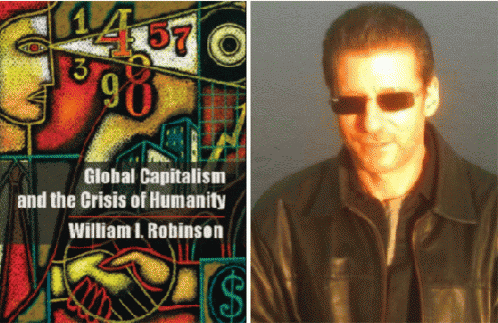
William I. Robinson and his book, Global Capitalism and the Crisis of Humanity
(Image by William I. Robinson) Details DMCA
Link to podcast: Why We Need TransNational and Global Consciousness -- William I. Robinson
Thanks to Tsara Shelton for helping with the transcript editing.
Rob: Welcome to Rob Kall Bottom Up Radio Show. My guest tonight is William I. Robinson. He's a professor sociology at UC Santa Barbara, and he's written a new book, Global Capitalism and the Crisis of Humanity. Welcome to the show.
WR: Thank you, thank you for having me on.
Rob: Now I want to do something a little different with you. I'd like get an idea of what your goal for this book is and the goal for your work is. You've been at this for decades, what is your goal?
WR: I think we cannot change a system that we don't understand. So most of the book is dedicated to analyzing world capitalism in the 21st century or this age of globalized capitalism. And of course the book ends with some suggestions, analysis and suggestions of where social movements from below, and resistance movements are going. But I feel very strongly that we cannot effectively confront this system of global capitalism and the deep crisis that it has thrown us in without getting a very good grasp on the nature of global capitalism and how the world capitalist system which of course, 500 and plus years old, has changed in the last few decades.
Rob: Okay, that sets me up for a question I wanted to ask, you say capitalism has been around for 500 years. Can you give us an overview of the history of the evolution of capitalism which is another term that I'm taking from your writing and speaking.
WR: Yes, yes, of course. Well the system is born in Europe and we have the symbolic data 1492 the beginnings of the outward expansion of this system with the conquest of the Americas and genocide in the Americas. Of course it's, tomorrow is thanksgiving so it's a good moment to remember that genocide.So that's the birth of the system. It begins with outward expansion and it goes through, world capitalism goes through a number of phases over the next 500 years, but these are these phases, involves periods of outward expansion through colonial conquest and through imperialism. And each time these waves of colonial conquest and imperialism are closely linked to crisis in the system. Capitalism is a system that's wracked by crises, these crises grow out of the system itself. And each time there's a major crisis resulting in world wars or new waves of colonialism and imperialism, the system expands outwards. It conquers new people and new countries and brings them all into a global market and a single, increasingly single, global society. And by the time we reach the late 20th century, by the turn of the century, the entire world and all six billion or so people have one or another way been brought violently into the system. So there's really no countries and no peoples, and no regions of any significance that are longer outside of global capitalism. So to put it in a little more technical terms, but important to understand, all of these conflicts and the contradictions that are tearing our world apart are now internal to global capitalism, nothing really is taking place outside of this system.
Rob: All of these conflicts, what are you referring to?
WR: I am referring first of all to social violence on a global scale. I'm talking to the types of wars to which have happened in Paris and Lebanon and Libya, the wars in the Middle East. I'm talking to, about revolutions and upheavals. Slow motion genocides that are taking place in Africa and Latin America. All of the conflicts we see around us, I mean we can take any aspect of crisis and of conflict taking place in the world today and we can link it to changes that have taken place in world capitalism and the nature of global capitalism. For instance, there's this unbelievable wave of police violence against African Americans in the United States. That, believe it or not, can be very clearly related to structural changes that have taken place as a result of global capitalism. And we need to analyze racism in terms of these larger structures in the context of global capitalism. So anywhere you look in the world, we're in the midst of period of incredible chaos, upheavals, social struggles and conflicts, political crises, and all of this is, ultimately, each one has particular explanations, particular analysis, particular strategies that those of us from below can develop, but ultimately the larger structural context is world capitalism in this globalized stage of the 21st century.
Rob: Okay, I want to get back to your tying together the way that police violence towards blacks and global capitalism, but first why don't you give us an overview of some of the important, most important concepts tied with global capitalism.
Next Page 1 | 2 | 3 | 4 | 5 | 6
(Note: You can view every article as one long page if you sign up as an Advocate Member, or higher).





